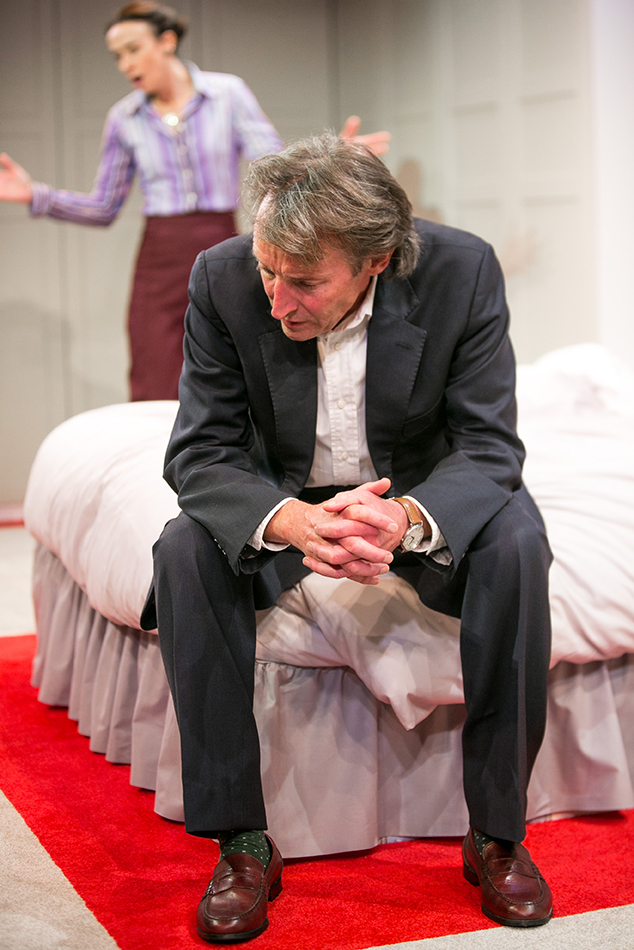The playwright Bathsheba Doran has blazed a stellar trail ever since graduating from Cambridge at the same time as David Mitchell and Robert Webb. After writing for them on the sketch show Bruiser, she earned her spurs as a comedy writer on Smack the Pony, won a Fulbright Scholarship, and eventually became a playwriting fellow at the Juilliard School.
The fact that she has subsequently been festooned with prizes for playwriting as well as being award-nominated for her work on the Martin Scorsese-produced HBO series Boardwalk Empire means hopes are high as you descend into the charmingly intimate surroundings of Jermyn Street Theatre. Here, Doran takes a scalpel to the heart of middle class complacency, as a man and a woman sit in their well-to-do bedroom, and argue about why their ten-year-old little darling has transformed into a tyrannical, teacher-terrorising demon.
 "They fuck you up, your mum and dad," chants the poem, but for the first part of the drama it seems to be the other way round as Jessica’s parents Judy (a lawyer) and Michael (a novelist) fret about her misdemeanours. We’re in prime liberal territory here – when Judy reveals that Jessica has been sharing a book featuring sex, Michael harrumphs that he’d prefer her to read something good, so "let’s get her some DH Lawrence". When he, in turn, complains that one of her friends, Victoria, is a "thug", Judy chides, "her mother is a potter."
"They fuck you up, your mum and dad," chants the poem, but for the first part of the drama it seems to be the other way round as Jessica’s parents Judy (a lawyer) and Michael (a novelist) fret about her misdemeanours. We’re in prime liberal territory here – when Judy reveals that Jessica has been sharing a book featuring sex, Michael harrumphs that he’d prefer her to read something good, so "let’s get her some DH Lawrence". When he, in turn, complains that one of her friends, Victoria, is a "thug", Judy chides, "her mother is a potter."
So it’s all potentially ripe fodder for chattering classes who want to escape their little darlings for the evening and do a little bit of comically-enhanced navel-gazing. As the novel-writing mother of an almost-ten-year-old myself, I was primed to enjoy watching my insecurities and hypocrisies as a parent played out on stage.
How disappointing then, to encounter a production in which the chemistry between the two leads and the (permanently absent) child is so negligible, it’s almost antiseptic. Right from the start, there’s a lack of credibility, as the actors – Amy Marston and Peter Hamilton Dyer – deliver their lines as if imagining something very remote from who they are, or ever wanted to be.
Obviously part of the point of Doran’s drama is the crisis of middle-class neglect, as parents – who think they’re doing fine – lose themselves in their careers and fail to appreciate their children’s needs. So yes, it is essential to the darker strand of humour that these parents reveal themselves to be increasingly alienated and self-absorbed as the evening progresses.

However, one of the key problems seems to be that neither Marston nor Hamilton Dyer has fully absorbed the rhythms of Doran’s speech patterns or comedy. Though Doran is British, the East-Coast American pedigree of this shows throughout, and you find yourself perpetually wondering how much better the lines would sound if delivered with a New York accent.
Of course you shouldn’t be thinking of them as lines at all – and the sense that Stella Powell-Jones’s production never quite hits the right momentum has a major knock-on effect. We start to doubt everything that plays out before us, not least the existence of the troublesome ten-year-old Jessica. Doran herself is a parent, so obviously knows about such matters. But it starts to nag that we only know about Jessica through her misdemeanours, and that there are no stories illustrating why at the same time as upsetting them she also, like all children, has a hotline to her parents’ hearts.
With such diminished credibility, the last part – which descends into mutual recriminations – far from being telling, is simply unpleasant to watch. The antiseptic becomes antisocial. You leave the theatre feeling that the Larkin poem said it better and quicker. Probably best to save the money on the babysitter for this one.














